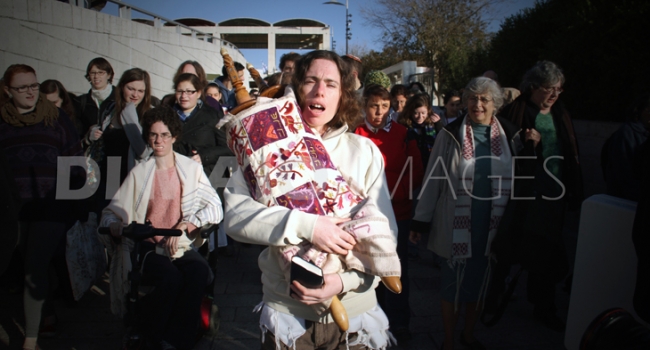Women challenge Orthodox monopoly on Jewish religion

A bunch of Jewish women are defying the laws of the State of Israel and the orthodox rules of the religion of Abraham. They are women determined to assert their right to pray in front of the Western Wall of the ancient temple of Jerusalem with a copy of the Torah. They propose reforms to the oldest monotheistic religion in the world, but they are derided by religious radicals and risk jail.
It’s almost sunrise on a cold December morning. Jerusalem is still asleep. Shops are closed, streets deserted. Each religious group contending the city is cloistered in its own neighbourhood: Christian pilgrims are awaiting the opening of the Holy Sepulcher’s gate, Jewish people carry Torah’s scrolls to the Western Wall and a call to prayer rings out from the speakers of a minaret. The Wailing Wall is impressive. It is made of huge stones cemented together by history and faith. Its base is divided in two artificial sections, where women and men pray separated by an iron fence by the secure control of a group of Israeli soldiers patrolling the square.
The fortification is one of the few original parts of the Temple of Jerusalem, built in 164 BC by Herod the Great after the destruction of the First Temple. For Jews, it is the holiest place in the world, the heart of their religious activities, and the conditio sine qua non of the Jewish religion. This is the place where Jewish origins, tradition and history become a unique experience, but it is also the center of political, social and religious arrangements and strict rules modeled, as in the rest of the State of Israel, in the spaces vacated by the status quo achieved between secularism and orthodoxy in 1948.
“In Israel, religious power is ruled by Orthodox Judaism, by very religious men who have a very low opinion of women [in religious matters] and attempt not to recognize the value of equality”, says Isabelle, a young Jewish girl of French origin, who recently became an Israeli citizen. “We are relegated to passivity”, she continues. “This applies not only to most synagogues, where we stand in silence and listen to men praying, but also at the Western Wall, where women are only allowed to stay in a restricted area , without the right to carry and read the Torah”.
Isabelle is a reformed Jew who has decided to challenge the obscure traditions of Orthodox Judaism. She speaks forcefully, with a passion visible on her eyes. She is determined, strong, prepared, as are all her companions, the other ‘Women of the Wall’. “Women of the Wall” is a non-profit organization composed of Jewish women and founded in 1988, after the assault by a group of haredim at the expense of hundreds of women engaged in prayer in front of the wall. Anat Hoffman, their tough president, says that “the organization’s mission is to obtain a definitive and official recognition of the rights of Jewish women to wear ceremonial dress, pray collectively and read the Torah in front of the Wailing Wall”.
Although she has been repeatedly stopped and arrested by Israeli police for bringing the Torah scrolls to the area of the Wall, Hoffman keeps trying, aware of the possibility of attracting attention of the Israeli public and opening a debate on the subject. “It is not easy”, adds Reut, another woman of the wall. “Every time we come to the Wailing Wall, the most extreme among Orthodox men whistle and cry out against us. Some of them insult us, and when we sing they try to drown out our voices with theirs”.
Reut points to these men. Then she joins the other women and starts singing religious songs. Most of the men pay no attention to the women’s section, but a small group of extremists often assails them. One of them stands up on chair and begins to whistle against the women. Other haredim imitate him. Someone exclaims slowly: “Sinners! Women of the street!”
The policemen following the events nervously, ready to intervene and make arrests. “On this issue the religious rules coincide with the rules of Orthodox Judaism and the inviolability of the State laws. Whatever the Orthodox rabbis say becomes law”, says Reut. The division of the area adjacent the wall is not equal. It is visibly in favor of men. According to Isabelle, “like the division, the prohibitions related to the Torah and ceremonial clothes are all against Jewish women, whether orthodox or reformed”.
Generally Orthodox women understand, accept and justify these limitations, but the reformed or secular Jewish women fight against them, appealing to the Supreme Court or the parliament, organizing protests and marches, suffering the psychological and physical violence of some haredim and risking criminal and administrative penalties.
When the situation at the Wailing Wall becomes tense, the women decide to leave, escorted by a double cordon of soldiers, and move to a nearby area not affected by religious events. “This is the place where the Supreme Court allowed us to unroll the Torah and pray”, explains Reut. The wall is far in front of them, separated by the pits and the boulders of the archaeological zone. They carefully place the sacred scrolls on a square white rock. “It’s a stone of the Temple of Salomon,” says an ecstatic Reut.
An assistant of Anat Hoffman uses a metal stick to indicate the verse to read. Many women wear the kippah, the small cap used by Jewish men; others follow the Torah reading from their books, but all are illuminated by the rays of the sun that has just climbed over the ancient City of David on a hill just outside the walled Jerusalem.
Among the participants there are smiling, embarrassed and proud people reading the ancient Hebrew with strong French and American accents. “Women are not accustomed to reading and reciting the Torah in public. Many of them have grown up in Orthodox Jewish families where everything is exclusively for men”, says Hoffman. For this reason, the prayer is sincere but casual, precise but not solemn. “It’s a celebration”, says Reut.
While the sun struggles over the scene, the women raise the Torah to the sky and pass it to everyone present so to give to everyone the opportunity to kiss and touch the holy rolls before they are covered by a brown bag where the ‘word of God’ will remain until the next prayer, until the next protest. Reut insists- challenging the Orthodox monopoly on Jewish religious life in Israel: “Until they recognize and protect our rights”.
Article published by Digital Journal and Emaj Magazine on December 11th 2010

















